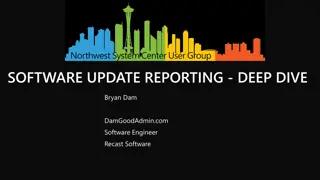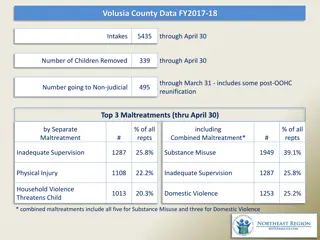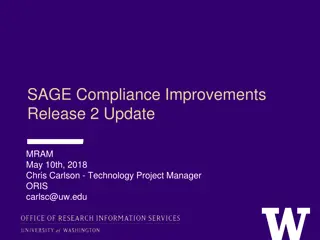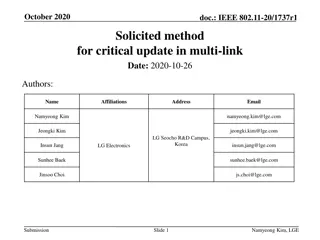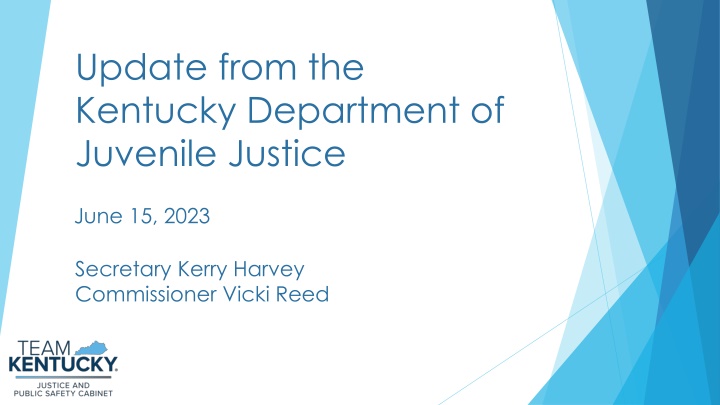
Decade-Long Trends and Solutions in Kentucky's Juvenile Justice System
Discover the recent developments in Kentucky's Department of Juvenile Justice, including changes in detention center populations, staffing challenges, and initiatives to improve recruitment and retention. Learn about salary increases, additional staffing appropriations, and the importance of ensuring safety in detention facilities for both offenders and staff.
Download Presentation

Please find below an Image/Link to download the presentation.
The content on the website is provided AS IS for your information and personal use only. It may not be sold, licensed, or shared on other websites without obtaining consent from the author. If you encounter any issues during the download, it is possible that the publisher has removed the file from their server.
You are allowed to download the files provided on this website for personal or commercial use, subject to the condition that they are used lawfully. All files are the property of their respective owners.
The content on the website is provided AS IS for your information and personal use only. It may not be sold, licensed, or shared on other websites without obtaining consent from the author.
E N D
Presentation Transcript
Update from the Kentucky Department of Juvenile Justice June 15, 2023 Secretary Kerry Harvey Commissioner Vicki Reed
The Department of Juvenile Justice serves as part of the juvenile justice system providing pre- conviction and post- disposition services. DJJ operates 29 facilities across Kentucky as of 06/12/23. 8 secure detention centers with 222 youth. 7 youth development centers with 117 youth. 8 Group Homes with 44 youth. 5 Day Treatment Centers (DJJ operated) As of 06/12/23: 220 kids in Alternatives to Detention
Over the past decade, the juvenile justice detention center population has changed resulting in a decrease in non-felony charges and an increase in felony charges. This is driven in part by SB 200 implementation.
Conditions negatively impact recruitment and retention. Limited staffing degrades facility security, programming, and recreational time for youth. Detention staff have long faced poor compensation and pension options, as well as difficult and dangerous work environments. Staffing As recently as two years ago, the starting pay for a frontline correctional officer at a juvenile detention center was $30,000. In October 2022, there were 60 vacant Youth Worker positions in Juvenile Detention Centers.
In December 2021, Gov. Beshear announced a 10% raise for all security positions at DJJ. In July 2022, the enacted budget provided an 8% increase for all state employees, including DJJ. In October 2022, Youth Worker starting salaries were increased to $44,616.16. Initiatives to Address Staffing In February 23, 2022, Gov. Beshear raised the starting salaries further to $50,000. In 2023, at the request of the Beshear administration, the General Assembly appropriated: $3.2 million to sustain previous DJJ salary increases $30 million to bring the starting salary to $50,000 for all DOC correctional officers The General Assembly appropriated $4.8 million to increase the salaries for all DJJ workers. Two years ago, the starting pay in Juvenile Detention Centers was only $30,000. Today, it is $50,000.
Based on a review of personnel needs, more employees are needed in each detention center to ensure the safety of offenders and staff. At Gov. Beshear s request, the General Assembly appropriated $9.7 million in the 2023 Session for 146 additional DJJ detention staff. Well-trained, properly-equipped staff in adequate numbers is a necessary predicate to the safe, orderly operation of detention facilities. In order to succeed, any programming designed to better the wellbeing and outcomes of juveniles in DJJ custody must be based on a foundation of safe and secure facilities. Continued Staffing Needs
The DJJ Correctional Officer-R program is in development, as required by statute. SB 162 Recruitment Initiatives DJJ developed a limited duration program to allow DJJ staff who have resigned to return at their previous employment classification with the approval of DJJ. Letters were sent to eligible individuals, and about 15 have expressed interest thus far. DJJ has reinstated 7.
Security Policies High-Security Facilities: Adair County Juvenile Detention Center Fayette County Juvenile Detention Center Warren County Juvenile Detention Center Low-Security Facilities: Boyd County Juvenile Detention Center Breathitt County Juvenile Detention Center Jefferson County Juvenile Detention Center McCracken County Juvenile Detention Center o At Gov. Beshear s directive, DJJ initiated significant changes to the structure of the detention system to increase security and operations for both staff and youth. o In December 2022, DJJ opened the first female-only detention center in Campbell County o In January 2023, DJJ separated male juveniles by security level based on severity of offenses
Due to a more aggressive juvenile population, comprehensive changes to DJJ policies, procedures, and regulations were necessary to provide staff with the protective equipment to adequately respond when violent incidents occur. Defensive Equipment In December 2022, leadership decided to utilize non- lethal defensive equipment for the safety and security of youth and staff. These include OC spray, conducted energy devices, and shields. Shields and OC spray were distributed to facilities starting in February 2023. All detention centers have been trained and certified on OC spray. DJJ is in the process of training on conducted energy devices.
On 12/19/22, DOC provided a general training to all DJJ detention and Youth Development Center facility superintendents on Security Threat Groups (STG) Security Threat Groups Recently, DJJ superintendents selected STG Coordinators in each facility On 3/21/23, STG Coordinators received training on how to identify STG membership, affiliations, and characteristics within facilities, along with STG data collections. DJJ collaborated with DOC and law enforcement on this training
On 03/24/23, DJJ began working closely with DOC on Emergency Response Team development and operations. Criteria, training, and incentives are being developed so each detention facility and youth development center will have an ERT that will undergo monthly drills. Emergency Response DJJ is developing MOUs with local law enforcement concerning emergency responses as mandated by SB 162.
In order to enhance professionalism, in December 2022, DJJ decided to provide uniforms to correctional officers. The procurement of uniforms followed, and uniforms were subsequently mandated by SB 162. All facilities have received their first shipment of uniforms. Uniforms
The DJJ Training Division is updating the security topics included in its monthly emergency response training for all facilities. These are currently in review for approval with the goal to begin in June 2023. DJJ is also updating its management training program for staff, as mandated by SB 162. Training
Gov. Beshear proposed a reorganization of DJJ to align management by function rather than geography. The General Assembly codified this structure in SB 162. The reorganization primarily separates the detention centers from other DJJ facilities and programming. Reorganization This necessary change better enables management to focus on the particular needs of detention centers, emphasizing safety and security. The reorganization creates: Compliance Division Office of Detention with a Division of Transportation. The Detention Executive Director also serves as the Director of Security.
For the first time in Kentuckys juvenile justice system, a Director of Security position and a Director of the Office of Detention were created. Larry Chandler was hired as Director of Security on 01/01/23 for DJJ to provide assessments and recommendations on security for DJJ s facilities. James Sweatt was hired as the Director of the Office of Detention on 05/06/23 to oversee the detention facilities. Predisposition facilities face different challenges than post-disposition facilities and should be managed as such. DJJ created the Compliance Branch on 01/16/23 to conduct unannounced facility inspections and staff interviews to ensure best practices are identified and followed. The division enhances safety and security throughout DJJ and makes recommendations to leadership for improvement. Detention & Compliance
The safety, security, and wellbeing of youth and staff depends on accurate and timely data. DJJ data systems were built for a different time and a different population. Recent events made clear that the data landscape at DJJ is outdated, siloed, and inadequate for current needs. On 01/31/23, DJJ was added to the Kentucky Offender Management System (KOMS) Master Agreement. This will eventually upgrade DJJ s offender management system. Data This process will take several phases to fully implement, but the project is on track with Phase 1 modules purchased. Phase 4 will finalize the project and is expected to be complete in early 2025.
Critical improvements have been underway or completed at the Jefferson, Warren, and Breathitt Detention Centers. JPSC contracted with the American Correctional Association to inspect facilities and identify necessary improvements. This is different from the regular audits and collaborative work that DJJ has done with ACA over the years. Director of Security Larry Chandler assessed each detention center and recommended needed improvements. Facilities DJJ leveraged DOC expertise in reviewing needs, providing training, and more. Detention facility upgrades are in process and in planning, including modifying doors, locks, cameras, control panels, etc. DJJ is reviewing plans to improve perimeter security. SB 162 included $4 million for security upgrades.
SB 162 requires DJJ to enter into sufficient contracts to ensure availability of institutional treatment for youth with severe mental illness. DJJ is also required to provide youth in crisis in a DJJ facility access to mental health professionals. The bill includes $1.5 million for DJJ to establish a diversionary program to identify and provide treatment for any youth identified as suffering from serious mental illness. HB 3 requires automatic detention of youth accused of public offenses considered violent felony offenses for up to 48 hours, exclusive of weekends and holidays, pending a detention hearing. Recent Legislation & Mental Health Youth detained for these offenses are required to be assessed by a mental health professional Any treatment recommended must be provided by DJJ and may be provided via a contract between JPSC and a behavioral health services organization. Effective date of automatic detention provision is 07/01/2024. HB 3 allows for youth in detention to have visitation from nonprofit organizations, faith-based organizations, or community organizations to better facilitate transition services.
Detention staff must handle a wide variety of youth and situations due to the nature of detention, and they must triage immediate needs of youth in custody. Mental health and education services are provided to youth in detention. However, because their cases have not concluded, DJJ is limited in the programming it can provide in detention. Challenges to Mental Health Services in Detention Formal evidence-based treatment is limited in detention: Youth may not be guilty of the offense for which detained Youth and parents have the right to refuse treatment. Parents must give informed consent. Duration of detention is unpredictable and often not long enough for effective services. Not all youth need treatment services.
DJJ released an RFP for institutional mental health treatment at detention centers on 05/15/23. This closed on 06/12/23 with no responses. Private healthcare organizations are not required to accept DJJ youth, and DJJ has historically faced significant barriers to placement for violent youth with severe mental health issues. Private treatment facilities often will not admit, or will prematurely discharge, severely mentally ill youth who are aggressive or violent. Absent any clinical mental health alternative, DJJ detention facilities may be the custodian of last resort. However, a child suffering from severe mental illness cannot be adequately treated in a juvenile detention center neither designed nor staffed as a clinical facility. DJJ is working with the State Interagency Council for Services & Supports to Children to establish the diversionary program to identify and provide treatment for youth suffering from severe mental illness. DJJ seeks to improve mental health services and that youth have access to mental health professionals within detention facilities. Mental Health Services
SB 162 codifies investments Beshear administration has made in DJJ since 2022 and provides requested statutory language to continue improvements to staffing and security. 2023 Regular Session: SB 162 SB 162 also requires that JPSC develop and implement a plan to create a new model of regional detention as soon as practicable while safely segregating males and females and separating violent and nonviolent offenders.
$3.2 million to maintain salary increases for DJJ youth workers $4.8 million to provide salary increases to other job classifications at DJJ $30 million to bring DOC correctional officers to $50,000 starting salary 2023 Regular Session: SB 162 $9.7 million for 146 additional DJJ youth workers $200,000 for operating expenses for DJJ youth offender management system $4 million to provide security upgrades within DJJ detention centers $1.5 million for DJJ to establish a diversionary program to identify and provide treatment for any youth identified as suffering from serious mental illness $1.75 million to retain design experts to determine what facility changes are needed to return to the regional model $250,000 for transportation costs for female youth to be used until there is a return to the regional model
HB 3 provides appropriations to reopen the Louisville detention facility: $13.4 million to design and construct the first phase of renovating the downtown Louisville Youth Detention Center $2 million to DJJ for operating costs for the Jefferson County Youth Detention Center $4.5 million to DJJ for the renovation for the Jefferson Regional Juvenile Detention Facility at Lyndon. 2023 Regular Session: HB 3
According to AOC data, had the automatic detention provision in HB 3 been in effect in 2022, it would have resulted in the detention of more than 400 additional juveniles compared to existing law. SB 162 requires that juveniles be detained at their closest detention center as soon as practicable while safely segregating males and females and separating violent and nonviolent offenders, a departure from existing practice. 2023 Regular Session: Capacity Issues & Recent Legislation SB 162 required that males and females be housed in the same facility. SB 162 requires that four groups of juveniles (high offender males; low offender males; high offender females; and low offender females) be housed in the same facility but kept separated from one another. Separation requires not only separate sleeping quarters, but separate programming, schooling, dining. and recreational activities. Combined with the additional detainees produced by HB 3, this SB 162 mandate will be extraordinarily difficult to meet given the relatively small capacity of each detention center and the limitations of aging physical facilities not designed for this circumstance.


